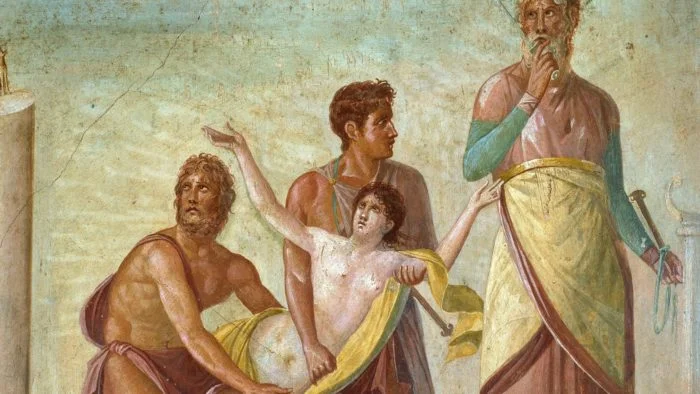Human sacrifice is a practice that has been present in various cultures throughout history, often tied to religious or ritualistic beliefs.
The Romans, known for their advanced civilization and legal system, have a curious history of human sacrifice.
Despite engaging in this practice at certain points in their history, they eventually abhorred it.
This article explores the historical context, religious evolution, socio-political factors, and moral shifts that led the Romans to abandon human sacrifice.
I. Early Roman Practices: To understand why the Romans eventually abhorred human sacrifice, it’s crucial to examine their early history. In the early days of the Roman Republic, human sacrifice was not uncommon. This practice was often associated with rituals related to appeasing deities and seeking their favor.
II. Influence of Etruscan and Celtic Neighbors: The Romans were influenced by neighboring cultures such as the Etruscans and Celts, who had their own traditions of human sacrifice. This influence played a significant role in shaping Roman religious practices.
III. The Roman Legal System: The Roman legal system, known for its sophistication and emphasis on justice, began to clash with the concept of human sacrifice.
As Roman law evolved, the moral implications of taking a life for religious reasons came under scrutiny.
IV. Evolution of Roman Religion: The Roman religious landscape underwent significant changes over time. The introduction of new deities and the merging of religious traditions led to a more inclusive and less bloodthirsty belief system.
V. Influence of Greek Philosophy: Greek philosophy, particularly Stoicism and Epicureanism, had a profound impact on Roman thought. Philosophers like Seneca and Cicero advocated for ethical principles that contradicted the practice of human sacrifice.
VI. Rise of Christianity: The emergence and rapid spread of Christianity in the Roman Empire posed a direct challenge to human sacrifice. The Christian message of compassion and the sanctity of human life conflicted with traditional Roman rituals.
VII. Social and Economic Factors: As Rome expanded and became a dominant world power, its social and economic structures became more complex. Human sacrifice became impractical and inconsistent with the empire’s bureaucratic machinery.
VIII. Changing Religious Authorities: The authority of Roman religious institutions also evolved. The power of the Senate and the Emperor’s influence over religious matters diminished, allowing for a more diverse and inclusive religious landscape.
IX. Decline of Paganism: With the decline of traditional Roman paganism, which often endorsed human sacrifice, alternative religious beliefs and practices gained prominence, further eroding the tradition of sacrifice.
X. Public Opinion and Morality: Public opinion in Rome began to shift towards a more humanitarian perspective. The moral repugnance of human sacrifice became increasingly evident to the Roman populace.
XI. Philosophical Critique: Prominent philosophers like Pliny the Elder and Plutarch wrote extensively against human sacrifice, challenging its moral and practical foundations.
XII. Imperial Edicts: Several Roman emperors issued edicts against human sacrifice, marking a turning point in the official stance of the Roman government on the practice.
XIII. Historical Accounts: Historians and scholars of the time, such as Livy and Tacitus, documented the decline of human sacrifice, helping to shape the narrative of Roman history.
XIV. Archaeological Evidence: Archaeological discoveries, including altars and artifacts, provide physical evidence of the transition away from human sacrifice in Roman religious practices.
XV. Cultural Shift: The cultural shift away from human sacrifice was not limited to Rome alone. It reflected broader changes in the ancient world, influenced by the rise of ethical and humanitarian values.
XVI. Legacy of Abhorrence: The Romans’ eventual abhorrence of human sacrifice left a lasting legacy, influencing future generations and helping to shape modern ethical and moral frameworks.
XVII. Modern Reflection: Today, the Romans’ journey from practicing human sacrifice to abhorring it serves as a historical case study in moral progress and the evolution of cultural values.
XVIII. Lessons for Humanity: The Roman experience offers valuable lessons on how societies can evolve, question established practices, and reject rituals that harm humanity in the name of tradition.
XIX. Ethical Challenges: Despite their progress, the Romans still faced ethical challenges in other aspects of their society, highlighting the complexity of moral development.
XX. Conclusion: The transformation of Roman attitudes towards human sacrifice is a testament to the human capacity for moral growth.
It reflects the interplay of religion, philosophy, politics, and societal values in shaping a civilization’s ethical landscape. Understanding this transformation helps us appreciate the importance of critical thinking, compassion, and moral progress in the evolution of societies throughout history.
